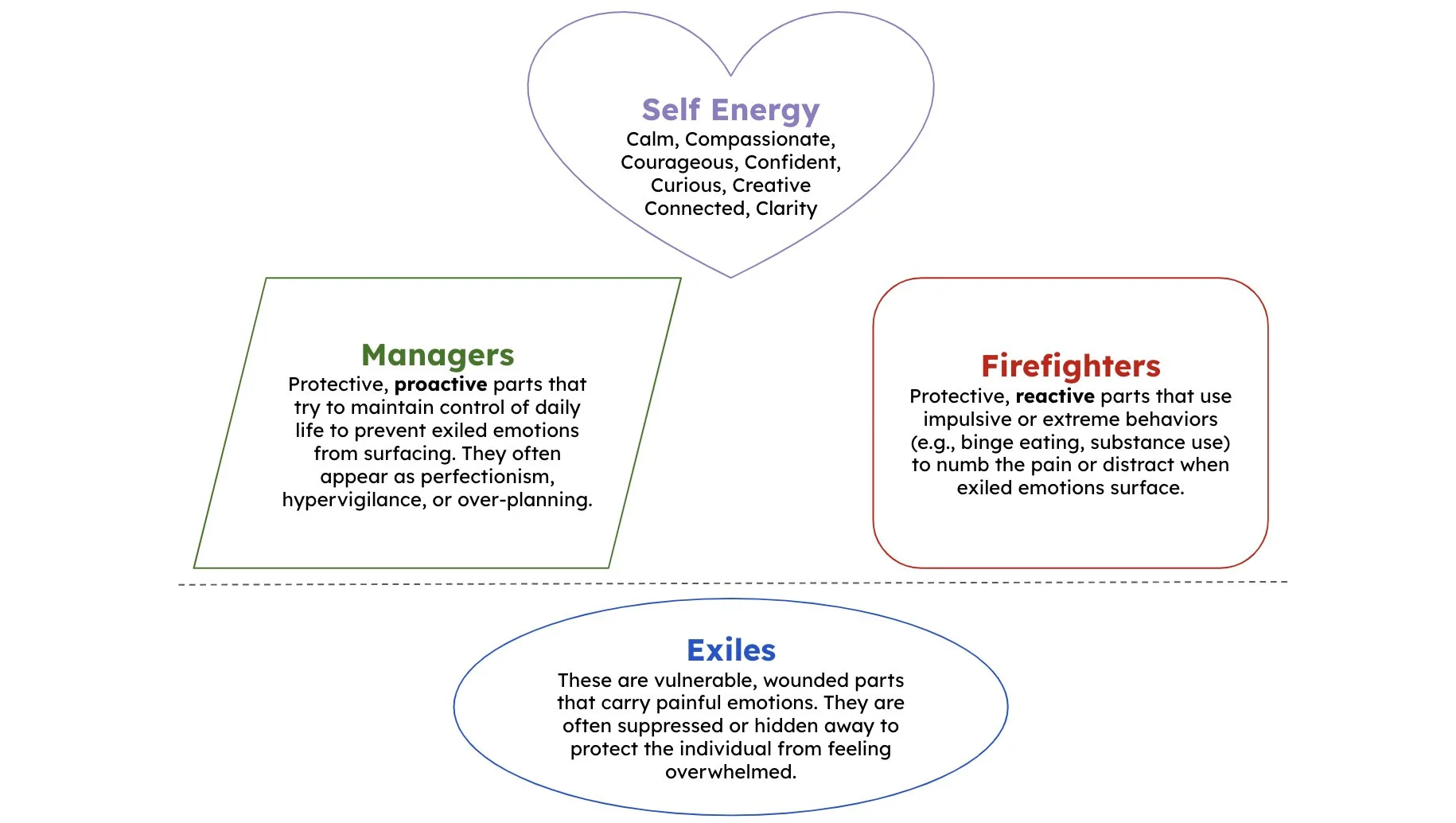Internal Family Systems Therapy in Chicago
Schedule Your 1st Appointment
Meet Our Internal Family Systems Therapists
What Our Clients Are Saying
-
During our first session Hannah was proactive in creating a plan of action to properly diagnose me and address my concerns. Detailed. Office is beautiful. Love the decor, relaxing ambiance and free tea.
———
-
She was very kind and thorough during intake and the entire office looks like something out of a lifestyle magazine.
———
-
The office is lovely and welcoming, the in-take paperwork helped me prepare for what I wanted to talk about and gave me a starting point.
———
-
Dr. Yang is warm and empathic, and made me feel comfortable from the very beginning.
———
-
Emma has been very supportive through major life changes for me. Her sweet and gentle nature made it easy for me to feel safe to open up to her. I am very grateful for her support and kindness.
———
-
It was my first visit and she made me feel so safe. I opened up right away!
———
What is Internal Family Systems Therapy?
Internal Family Systems (IFS) Therapy is a therapeutic approach that believes every person has multiple "parts" of their psyche, sub-personalities that contain their own belief system, role, and emotional experience. IFS is a non-pathologizing approach to healing, meaning that the therapy does not view behaviors, emotions, or internal conflicts as signs of disorder or illness. Instead, IFS assumes that every part of a person’s mind — whether it expresses through anxiety, anger, perfectionism, or self-sabotage — has a positive intention, often rooted in an effort to protect or help the individual survive difficult experiences.
IFS respects how protective, smart, and adaptable human psychological systems are, and encourages clients to engage with their parts compassionately, understanding their roles and unmet needs. This perspective helps people shift from self-criticism to self-acceptance, recognizing that even seemingly destructive parts (like addictive behaviors) are trying to serve a protective function. Healing in IFS comes from befriending and integrating these parts, setting itself apart from other mainstream therapy approaches.
Origins of IFS
IFS is rooted in both modern psychotherapy and insights that align with indigenous and ancient wisdom traditions, which have long recognized the multiplicity of the mind and the importance of internal harmony. IFS was developed in the 1980s by Dr. Richard “Dick” Schwartz, a family therapist, who initially applied family systems theory to his work with individuals. Schwartz noticed that, just as families consist of members with distinct roles and patterns of interaction, his clients described inner experiences involving various “parts” with conflicting emotions and goals. Inspired by his clients’ ability to describe these parts, he shifted from trying to control them to listening with curiosity, leading to breakthroughs in emotional healing.
How Do Internal Systems Operate?
In IFS, the inner system contains parts, including protective parts (called managers and firefighters) and vulnerable parts (called exiles), and at the core, a wise, calm, compassionate inner essence (called Self or Self-energy). Protective parts keep the exiles hidden away, safe from exposure.
Self: IFS posits that everyone has a core "Self"—a wise, calm, compassionate inner essence that cannot be damaged or eliminated. The Self is not a part but a grounded state of being that brings balance and healing to the parts. The goal of IFS is to help people become more “Self-led,” meaning their Self takes the lead, allowing their parts to relax and function harmoniously, leading to greater self-trust. Many people and cultures may refer to self as spirit, soul, higher self, or wise one within.
There are 8 C words to identify Self-energy:
1) Calm, 2) Compassionate, 3) Courageous, 4) Confident,
5) Curious, 6) Creative, 7) Connected, 8) Clarity
Protective Parts: Protective parts are sub-personalities that work to shield a person from emotional pain or distress, often developed in response to past trauma or difficult experiences. These parts aim to prevent vulnerable, wounded parts (exiles) from being triggered. There are two types of protectors:
Managers: Proactive parts that try to maintain control of daily life to prevent exiled emotions from surfacing. They often appear as perfectionism, hypervigilance, or over-planning.
Firefighters: Reactive parts that use impulsive or extreme behaviors (e.g., binge eating, substance use) to numb the pain or distract when exiled emotions surface.
Exiles: These are vulnerable, wounded parts that carry painful emotions like shame, fear, or sadness. They are often suppressed or hidden away to protect the individual from feeling overwhelmed.
In IFS, it is essential to understand that the protective roles of managers and firefighters are particularly crucial when an individual is still in an unsafe or unstable environment or going through a challenging chapter of their life. These parts work tirelessly to keep exiles hidden, recognizing that if these deep emotional burdens surface, they could overwhelm the person and compromise their ability to function or stay safe. In such situations, these protective parts are not necessarily obstacles to healing but lifelines, helping the person navigate difficult circumstances where emotional vulnerability could lead to further harm. IFS therapy acknowledges that healing exiles can only begin when the individual is in a safer environment or has developed enough internal resources, honoring the protective parts’ wisdom in knowing when it’s safe to allow those emotions to surface. This approach ensures that therapy moves at a pace that respects the person’s reality, fostering trust between parts and maintaining stability until deeper healing can occur.
IFS Can Help With…
-

Trauma and Complex PTSD
-

Anxiety
-

Depression
-

Eating Disorders
-

Addiction and Substance Use
-

Identity Exploration
-

Relationship Challenges
-

Chronic Illness and Pain
-

Stress and Burnout
-

Grief and Loss
-

Sensuality and Sexuality
-

Boundaries
Benefits of IFS Therapy
Internal Family Systems (IFS) therapy offers several benefits, empowering individuals to develop a deeper understanding of themselves, heal emotional wounds, and foster internal harmony. Some key benefits include:
Self-Compassion and Acceptance:
IFS encourages individuals to approach their thoughts, emotions, and behaviors with curiosity and kindness, reducing self-judgment and promoting self-compassion. A key tenet of IFS is “All Parts are Welcome.”
Healing Trauma and Emotional Wounds:
By working with exiled parts, IFS helps individuals process and integrate painful past experiences, addressing the root causes of trauma rather than just managing symptoms.
Improved Emotional Regulation:
As protective parts (like managers and firefighters) learn to relax and trust the Self, individuals experience greater emotional balance, reducing impulsive or overwhelming reactions.
Empowerment, Self-Trust, and Self-Leadership:
IFS fosters access to the core Self, empowering people to become more self-led and navigate challenges with calm, clarity, and compassion.
Reduction of Internal Conflict and Related Anxiety:
It promotes harmony between parts, helping individuals understand and integrate seemingly contradictory thoughts or behaviors (e.g., procrastination and perfectionism).
Non-Pathologizing Approach:
IFS views all parts as having positive intentions, reducing shame and stigma around behaviors that may otherwise feel dysfunctional or problematic.
Strengthened Relationships:
As people develop a more compassionate relationship with their internal parts, they often improve how they connect with others, fostering healthier relationships through increased empathy and authenticity.
Overall, IFS can help show you that you have great resources within you. As shown below, IFS therapy can help reveal your Self-energy and support you finding balance and harmony within your internal system, ultimately allowing you to be present and connected in your life. You will learn to embrace all of who you are and know that there are “no bad parts.”
IFS-informed Therapy at Balanced Awakening
Many of our therapists offer IFS-informed Therapy as part of their therapeutic work. To highlight a few:
Andrea Espinosa, LCSW offers compassionate exploration of parts with her clients and is IFS Level-1 Trained.
Caitlin Stumpner, Psy.D. weaves IFS principles into other modalities to best serve her clients.
IFS therapy is offered as part of individual therapy that takes place either in-person or virtually. We are here to help you feel more connected to yourself, all of you. Contact us if you have questions or book online with an IFS therapist of your choice.
Internal Family Systems Therapy Blog Posts
Internal Family Systems Therapy FAQs
-
Trauma and Complex PTSD
Anxiety
Depression
Eating Disorders
Addiction and Substance Use
Identity Exploration
Relationship Challenges
Chronic Illness and Pain
Stress and Burnout
Grief and Loss
Sensuality and Sexuality
Boundaries
-
In the first two sessions, your therapist will ask you questions about your life currently, your history, and where you hope to be in the future. From there, you and your therapist will discuss goals for IFS therapy and come up with a plan. Therapy done with an IFS framework typically follows the same trajectory and length as other forms of psychotherapy.
-
Yes! But with some exceptions. There are 3 situations where, legally and ethically (whether we want to or not) we would have to break your confidentiality. These include if we learn of any potential child or elder abuse from you, we determine that you are at risk of harming yourself or someone else, or we receive a court order for your medical records. Also, some of our providers are under supervision and regularly consult with their supervisor about their client sessions. Supervisors have the same obligation to client confidentiality.
-
Our therapy rate for the first two sessions is $250. After that, 55 minute sessions are $225.
Most of our therapists are in network with United Healthcare/Optum, BCBS PPO and Aetna insurance.
-
Yes! We offer virtual IFS therapy sessions as well as in-person. Sometimes it’s easier for clients to engage in therapy virtually- and in most cases it’s just as effective!
-
IFS can help build self compassion and self acceptance. It’s helpful in working through trauma and emotional wounds from the past. It also helps people cope better with stress and experience improved emotional regulation. It can also strengthen relationship.












